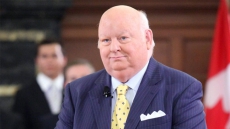TORONTO — A proposal by Ontario's securities watchdog to pay corporate whistleblowers up to $1.5 million is too stingy to spur senior executives with knowledge of accounting fraud, insider trading and market manipulation to come forward, a number of experts say.
"I don't think we should be calling on potential whistleblowers to be heroes," class action lawyer Dimitri Lascaris said during a roundtable held in Toronto on Tuesday to discuss the Ontario Securities Commission's proposed whistleblower program.
If implemented, the program would be the first of its kind for Canadian securities regulators.
The provincial securities watchdog has modelled the program after the one at the U.S. Securities and Exchange Commission, which has received more than 10,000 tips since it was introduced in 2011 and has resulted in some large payouts.
The Ontario Securities Commission would offer smaller rewards than its U.S. counterpart. The securities regulator is proposing to pay whistleblowers up to 15 per cent of the sanctions or settlement payments in a successful case involving $1 million of sanctions or more. Payments would be capped at $1.5 million.
That's compared to the 10 to 30 per cent payout the U.S. securities regulator offers whistleblowers.
Lascaris, a lawyer with Siskinds LLP, says the reward amount proposed by the Ontario Securities Commission is "highly inadequate" to compensate corporate tipsters for the risks they would bear.
"Whistleblowers are frequently the targets of retaliation," Lascaris said, noting that tipsters could lose their lucrative jobs and become blacklisted from working in their industries.
A payment of $1.5 million is not enough to provide long-term financial security for senior executives and their families, Lascaris said.
A number of other experts at the roundtable event also took issue with the compensation amount, noting that whistleblowers could stand to gain far more by going along with fraudulent practices.
"Senior (executives) have a lot to lose," said Jordan Thomas, a lawyer with Labaton Sucharow, who recommended that the securities regulator set a minimum compensation amount.
Marian Passmore, director of policy with the Canadian Foundation for Advancement of Investor Rights, suggested offering more than the $1.5 million maximum.
The securities regulator says that while it will strive to protect the identities of whistleblowers, there are a number of exceptions under which it may need to reveal them — for example, if it's necessary in order for commission staff to make a case against an accused, or if an accused needs to know a whistleblower's identity in order to defend himself or herself fully against the allegations.
But the regulator is proposing introducing anti-retaliation measures into the provincial Securities Act to protect whistleblowers from harm if their identities do become revealed.





